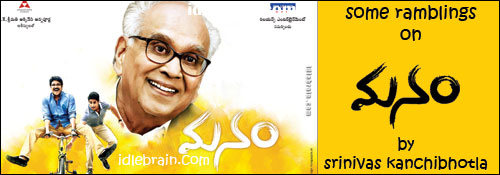
The genius of 'Manam' is not merely the central idea that any equation involving love balances out in the end, even when 'the end' can mean generations and lifetimes. Such ideas have been explored before, like in Arronofsky's 'The Fountain', 'The Red Vioin', to name a few. The audacity of 'Manam' lies in doubling down on that idea, that just as one lovelorn child tries to patch up his parents, this time assuming an elderly role, there could be someone else trying to balance his equation out too working on a different tangent. Isn't life just wonderful? Accounts of anonymous benevolences, random acts of kindnesses and such might just be universe's way of furiously working towards a zero remainder, closing out all the accounts and making sure all debts are paid up, before it shuts the shop. The magical occurrence of the right person at the right time delivering the much needed result to pull one out of a dire and hopeless moment is a regular phenomenon even in this 'realistic' setting. While science, which only deals with the 'how' of an event and never with 'why', brushes these coincidences asides as anamolies in an otherwise predictable system, the established fact that some 'effects' have 'causes' that belie rational understanding of the mind (simply because the seed of the cause is planted so far away in time and space from the effect) has an equal footing even in this scientific world. The real life examples of kids speaking about their past lives with the precise details of their past family settings might just be nature's inability to wipe the slate clean while starting afresh in the face of some strong emotions that remain hidden in the deep recesses of the mind. Or could it simply be the mind playing tricks overcompensating or making amends to a deep seated guilt that it cannot but marry inexplicable events to unanswered questions in life? Or, just as a possiblity, is there really something more beyond the concenpt of comperehension? If all those coincidences, random acts, deus ex machinas are part of life, then equally 'Manam' is just as realistic and plausible as the sweet surprises in the peculiar life. This movie is an exercise of great belief in the strength of the material and complete honesty in its execution. That is not to say that the script isn't without faults or cop outs, particuarly towards its rushed ending (where the writer painted himself tightly in a corner and the director couldn't wriggle him out), but like many things in life, belief trumps proof, feeling (అనుభూతి) outweighs experience (అనుభవం).
Nagarjuna, as an actor, generally operates in a limited range. Though he has his fair share of highs, he often feels comfortable within that set band. But this role, both as child and a father, is unequivocally his histrionic best. 'The consciousness of love awakens kindred souls through many a generation' might sound lofty and abstract on paper, but when translated to the screen, and more so in the mainstream, that is someone portraying the discovering of his dead parents in another generation with all the shock and awe. This is not an author backed role. This is one that demands more from the actor to deliver the seemingly ridiculous premise. But the honesty of Nagarjuna's depiction (his usual weaknesses, his eyes and his voice, becoming his greatest strengths here, exuding all the sincerity and vulnerability, much like Sanjay Dutt's portrayal of Munna bhai) erases away the unwanted sinister undertones (that of a stalker or a predator) and the laughable sideeffects of the role. Added to the fact that he was working through the role with the awareness of his father's (f)ailing health makes his vulnerability that much more real and poignant. Supporting the director's singular and uncompromising vision are the music director with his mellifluous score - background and songs (though the theme music sounds mightily inspired by Seal's 'Kiss from a rose') - and the clean photography.
When it comes to quirkiness, the French movie 'Amelie' is a kind of bible to the current movie makers showing the possibilities of viewing the mundane as some cosmic celebrations - the slow budding of the flowers, an army of ants marching in a near perfect narrow line, the hands that sprout goosebumps on prolonged exposure to cold water....there needs to be no explanation here explaining the endearing. The idea touches the heart first before it reaches the mind. With all such quirkiness in place, 'Manam' delivers a similar evocation of love even without the familial bond of the involved; but their presence brings it that much closer to home. Kudos to the makers - writer and producer.
checkout http://kanchib.blogspot.com for Srinivas's Blog.
